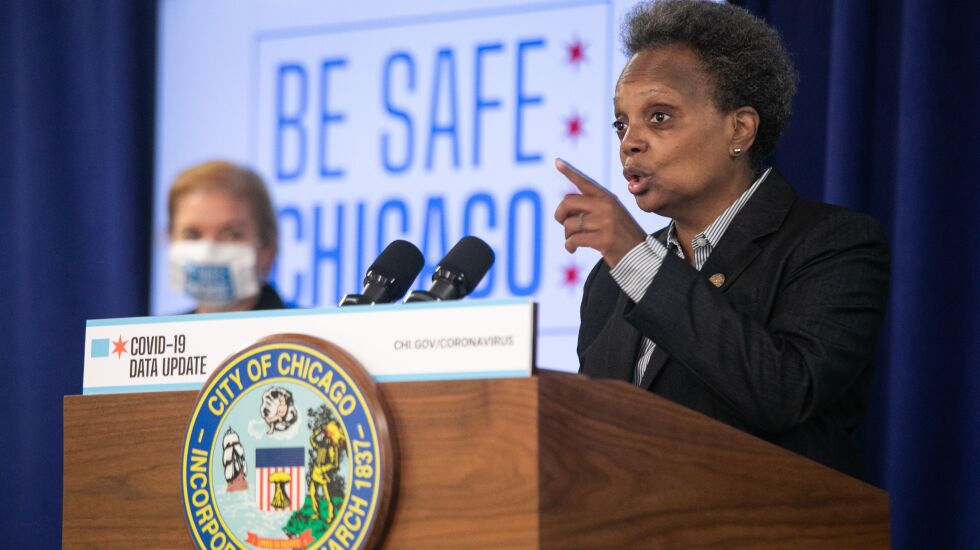
Former Chicago Mayor Lori Lightfoot is officially a college lecturer — at least for a semester — as her graduate-level class on “health policy and leadership” at Harvard University got underway last week.
Lightfoot said she’ll use a mock press conference, a simulated community meeting and guest speakers to teach in part about the dangers of politicizing a pandemic and how to interact with the media, drawing on lessons learned from running a city amid COVID-19.
“I heard that from the students yesterday — they want to learn from somebody who’s kind of been on the front lines, and in the trenches,” Lightfoot told WBEZ after her first class. “But also how you bring people together in a moment of crisis, how you get things done, how you build lasting foundations to build on to address other issues that come up.”
Lightfoot’s team announced in June she would teach as part of a senior fellowship at Harvard’s T. H. Chan School of Public Health. Lightfoot is based in Boston for the class, which meets on Wednesdays.
At the time of the announcement, critics took to social media to scoff at the news. Lightfoot lost February’s nine-candidate election with 17% of the vote. Her four years in office were marked, in part, by tense relationships with leaders in Illinois and Chicago, including Gov. J.B. Pritzker, as well as battles with the Chicago Teachers Union, the largest union that represents police and Chicago’s city council.
Lightfoot did not say directly whether she would address the more controversial pieces of her tenure — including a 2022 work stoppage by the CTU as the union fought for further COVID safety protections in schools.
“I’m not specifically planning to talk about the issues with the CTU and getting kids back to class, but obviously, talking about the challenges that communities have faced and the politicization, COVID fatigue, it wouldn’t surprise me if that issue came up, but it’s not a specific part of my lesson plan,” said Lightfoot, who took office in May 2019.
The pandemic brought to bear vast racial and economic disparities in Chicago’s health landscape. Lightfoot and public health commissioner Dr. Allison Arwady faced criticism for not responding to those disparities sooner — particularly in the rollout of the vaccine.
The city took lessons from those disparities too, though, creating so-called “Health Equity Zones” where the city partners with a lead community organization to push public health resources to disinvested communities. That includes boosting equity beyond the pandemic, such as improving access to food and medical care for mothers.
“People say to me all the time, it’s too bad that you were the mayor during COVID, because you weren’t able to actually get a lot of things done. I will tell you, I bristle at that a little bit. Because I’m very proud of the record,” Lightfoot said.
Lightfoot did not say whether Arwady, who was terminated last month by her successor, Mayor Brandon Johnson, will be a guest speaker. She did not comment on Arwady’s controversial firing, or on her successor’s tenure thus far.
“I think that the current administration and the mayor need to have the room to do their jobs. And they don’t need me to be on the sidelines, giving commentary or analysis,” Lightfoot said. “Of course, I have my views and opinions about a range of different things. But I think Mayor Johnson has earned my silence.”
Lightfoot plans to spend a portion of the class talking about how to communicate health policy and science to the media. During COVID, Lightfoot and Arwady developed a knack for quirky messaging: a stern-looking photo of Lightfoot with the slogan “stay home, save lives” turned into a viral meme; they donned festival gear in a video of Lightfoot and Arwady announcing Lollapalooza would return in 2021.
But Lightfoot’s overall record with the press in Chicago is a complicated one.
While Lightfoot attempted throughout her term to build a relationship with journalists by holding off-record roundtable discussions with the City Hall press corps and other corners of Chicago media, her news conferences became increasingly tense through her tenure, and by the end of her term she stopped holding press availabilities all together.
Lightfoot often complained of unfair media coverage and attributed it, in part, to the state of the news industry — that the demand by hedge fund and corporate owners for clicks and pageviews is influencing coverage. It’s a theory she repeated in the interview.
“When you think about that context, and then try to communicate something in the midst of the noise, it’s really complicated to do. And I want my students to be very clear-eyed about the challenges,” Lightfoot said. “So one of the questions that I posed yesterday was: ‘Should you concern yourself with what the media landscape is in a particular locale?’”
But despite her criticisms, Lightfoot’s answer to her own question seems to be “yes.”
“I want the students to understand that they can’t sit in their laboratories or in their offices and think grand thoughts. Because when you’re talking about trying to convince a skeptical public about any issue in public health, and what they should be concerned with, they’ve got to think about how they communicate,” Lightfoot said. “And communicating, obviously, building up that trust in those personal relationships is invaluable. But the media also has a role to play.”
Mariah Woelfel covers city government and politics for WBEZ.






